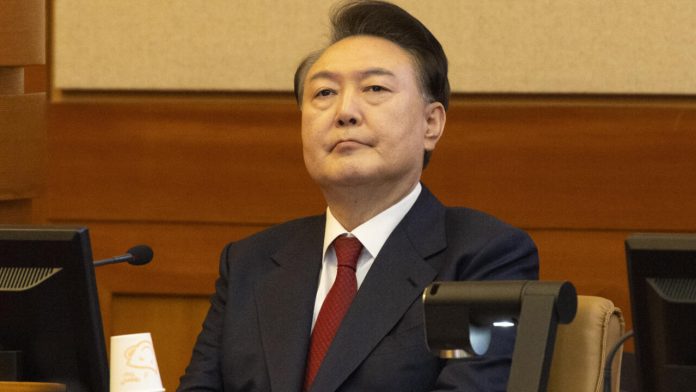Facebook Twitter (X) Instagram Somali Magazine - People's Magazine
Yoon Suk Yeol’s fate lies with the Constitutional Court after his controversial martial law declaration; a ruling could reshape the nation’s political future
South Korean President Yoon Suk Yeol is set to deliver a closing statement on February 25 as public hearings in his impeachment trial come to a close. The Constitutional Court’s verdict will determine whether he remains in office or is removed, less than three years into his five-year term. The decision lies in the hands of eight judges who are reviewing the legality and justification of his actions.
Charges and Justifications
Yoon’s impeachment stems from his controversial declaration of martial law on December 3, which parliament claims had no valid constitutional grounds. If the court upholds the impeachment, he will be forced to step down. Yoon, however, has defended his decision, arguing that he had the right to declare martial law. He contends that his intention was not to enforce full military rule but rather to issue a warning against what he described as the opposition Democratic Party’s abuse of its parliamentary majority.
Despite his arguments, his move sparked widespread criticism and led to accusations that he sought to undermine the country’s democratic institutions. His actions also resulted in the impeachment of the prime minister, who was serving as acting president at the time. Currently, the country is being led by the finance minister.
Final Statements Before the Court
On February 25, both Yoon and Jung Chung-rae, the chairman of parliament’s judiciary committee, will present their final statements before the Constitutional Court. The hearing is scheduled to commence at 2 PM (1 PM Singapore time). After the final arguments, the justices will take several days to deliberate before delivering their ruling.
During the trial, Yoon insisted that the martial law decree was not a failure but simply ended sooner than expected. He dismissed accusations that he had ordered military commanders to storm the National Assembly to prevent lawmakers from repealing the decree. He argued that, since no such military intervention ultimately took place and no harm was done, the allegations were unfounded.
However, parliament has countered that Yoon’s justification demonstrates a flawed understanding of national security. Lawmakers have expressed concerns that if reinstated, he might attempt to impose martial law again under similar circumstances.
Political and Legal Ramifications
The controversy surrounding Yoon’s decision has created a major constitutional crisis in South Korea. His martial law decree temporarily suspended political and parliamentary activities, leading to a broader confrontation between the executive and legislative branches of government.
Adding to Yoon’s troubles, he is currently detained at the Seoul Detention Centre over a separate criminal case in which he is accused of leading an insurrection. He is the first sitting South Korean president to face criminal charges while still in office.
The Constitutional Court has not provided a specific timeline for its ruling but has up to six months from December 14, when it formally registered the case following the impeachment vote in parliament. For reference, former President Park Geun-hye was removed from office in 2017 just 11 days after the final arguments in her impeachment trial.
If the court decides to remove Yoon from office, South Korea will have to hold a new presidential election within 60 days to select his successor. The outcome of this case could significantly impact the nation’s political landscape, influencing both domestic governance and international relations.
As the court prepares to issue its ruling, South Korea remains on edge, with political tensions running high and uncertainty looming over the country’s leadership.

